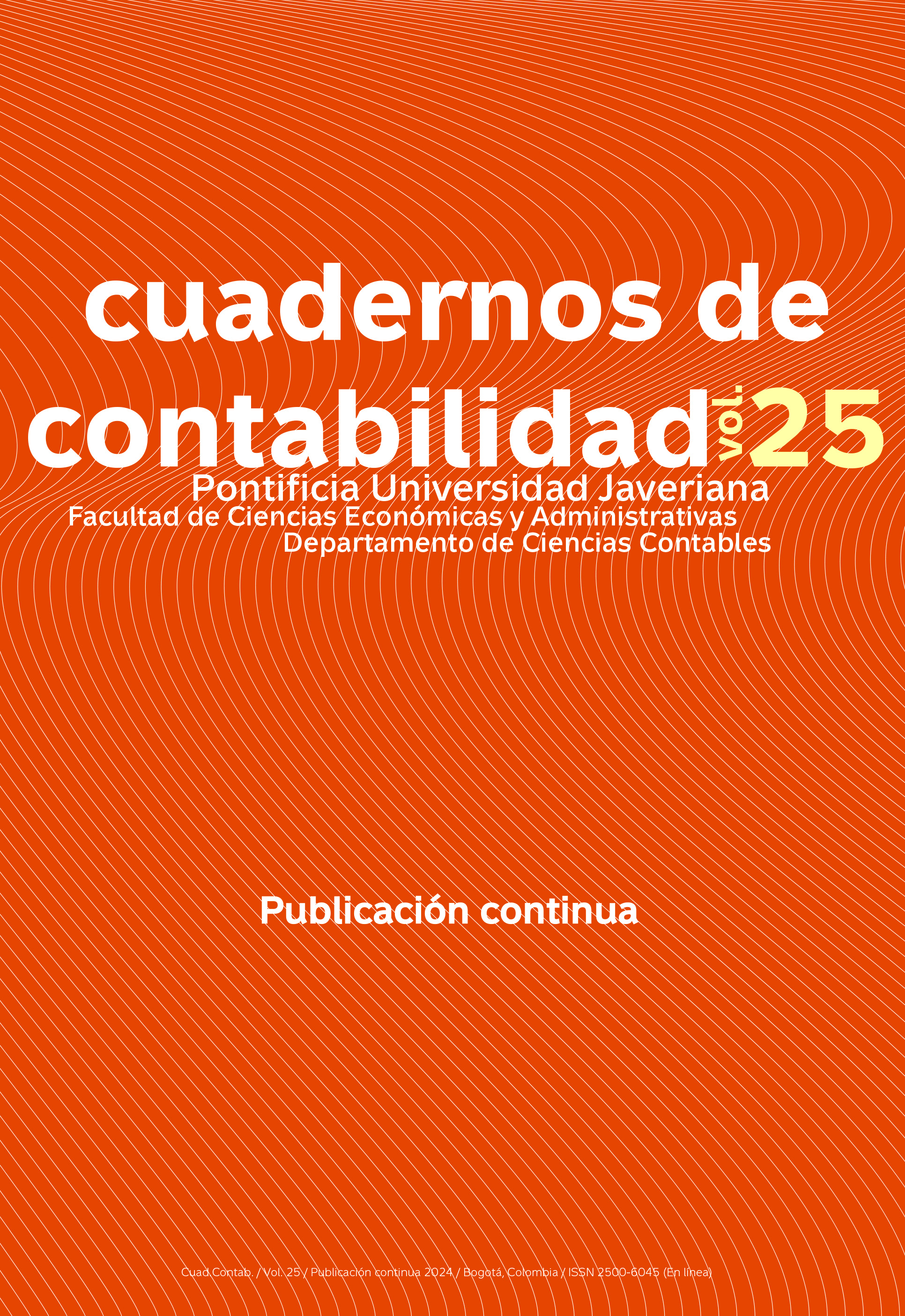Contribution of Socio-environmental Disclosures and Company Characteristics to Information Asymmetry Minimization: Evidence from Latin America
##plugins.themes.bootstrap3.article.details##
Socio-environmental disclosures and company characteristics can play a significant role in reducing information asymmetry. Hence, this research aimed to analyze the contribution of socio-environmental disclosures (ESG) and company characteristics to the minimization of information asymmetry among companies in Latin American countries from 2015 to 2020. The methodology was descriptive, documentary, and quantitative, using multiple linear regression with robust standard errors. The results revealed that governance disclosure had a negative impact on information asymmetry among companies in Chile. Regarding the company characteristics that reduced information asymmetry, the significance of company size (Chile, Colombia, and Mexico), financial leverage (Colombia), systematic risk (Argentina and Brazil), and market-to-book ratio (Brazil) is noteworthy. These findings suggest various contributions of ESG disclosures and company characteristics to information asymmetry minimization within the context of Latin American companies. The results guide company managers in adapting ESG disclosures effectively to reduce information asymmetry. Furthermore, they assist shareholders and stakeholders in evaluating the characteristics to be considered in reducing information asymmetry and encouraging companies to engage in ESG activities, considering the benefits of information asymmetry reduction.
Assimetria de informação, Divulgação, ESG, Empresas, América LatinaAsimetría de información, Divulgación, ESG, empresas, América LatinaInformation asymmetry, Disclosure, ESG, companies, Latin America
Banco Mundial (2023). Crecimiento del PIB (% anual). Disponível em: https://datos.bancomundial.org/indicator/NY.GDP.MKTP.KD.ZG
Bilyay-Erdogan, S. (2022). Corporate ESG engagement and information asymmetry: The moderating role of country-level institutional differences. Journal of Sustainable Finance & Investment, 1-37.
Brealey, R. A., Myers, S. C., Allen, F., & Mohanty, P. (2018). Principles of Corporate Finance. McGraw-Hill Education.
Cormier, D., Ledoux, M. J., & Magnan, M. (2011). The informational contribution of social and environmental disclosures for investors. Management Decision, 49(8), 1276-1304.
Cui, J., Jo, H., & Na, H. (2018). Does corporate social responsibility affect information asymmetry? Journal of Business Ethics, 148(3), 549-572.
Fama, E. F., & French, K. R. (1997). Industry costs of equity. Journal of Financial Economics, 43, 153-193.
Fuhrmann, S., Ott, C., Looks, E., & Guenther, T. W. (2017). The contents of assurance statements for sustainability reports and information asymmetry. Accounting and Business Research, 47(4), 369-400.
Husted, B. W., & Sousa-Filho, J. M. de (2019). Board structure and environmental, social, and governance disclosure in Latin America. Journal of Business Research, 102, 220-227.
IMD - International Institute for Management Development (IMD). (2023). IMD World Competitiveness Ranking. Disponível em: https://www.imd.org/centers/wcc/world-competitiveness-center/rankings/world-competitiveness-ranking/2023/
Jo, H., & Harjoto, M. A. (2011). Corporate governance and firm value: The impact of corporate social responsibility. Journal of Business Ethics, 103(3), 351-383.
Kim, J. W., & Park, C. K. (2023). Can ESG Performance Mitigate Information Asymmetry? Moderating Effect of Assurance Services. Applied Economics, 55(26), 2993-3007.
Lin, C.-S., Chang, R.-Y., & Dang, V. T. (2015). An integrated model to explain how corporate social responsibility affects financial performance. Sustainability, 7(7), 8292-8311.
Makkar, N., Mittal, S., Chugh, A., & Dhaka, K. (2020). Risk and return analysis of stocks listed in BSE and NSE: A review study. Journal of Engineering Sciences, 11(5), 386-400.
Michaels, A., & Grüning, M. (2017). Relationship of corporate social responsibility disclosure on information asymmetry and the cost of capital. Journal Management, 28(3), 251-274.
Miralles-Quirós, M. M., Miralles-Quirós, J. L., & Valente Gonçalves, L. M. (2018). The Value Relevance of ESG Performance: The Brazilian Case. Sustainability, 10(3), 574.
Mendes-da-Silva, W., & Onusic, L. M. (2014). Corporate e-disclosure determinants: evidence from the Brazilian market. Journal of Disclosure and Governance, 11(1), 54-73.
Moreira, J. C. C. (2018). Efeitos dos aspectos institucionais na anomalia dos accruals na América Latina. Tese (Doutorado em Ciências) - Universidade de São Paulo, Brasil.
Nguyen, V. H., Agbola, F. W., & Choi, B. (2019). Does corporate social responsibility reduce information asymmetry? Australian Journal of Management, 44(2), 188-211.
Pinheiro, A. B., Oliveira, M. C., Freitas, G. A. D., & García, M. B. L. (2023). Atributos do conselho e divulgação ambiental: Qual é o nexo nas economias liberais? Revista de Administração de Empresas, 63(4), 1-23.
Shevlin, T., Urcan, O., & Vasvari, F. P. (2020). Corporate tax avoidance and debt costs. Journal of the American Taxation Association, 42(2), 117-143.
Siew, R. Y., Balatbat, M. C., & Carmichael, D. G. (2016). The impact of ESG disclosures and institutional ownership on market information asymmetry. Asia-Pacific Journal of Accounting & Economics, 23(4), 432-448.
Spence, M. (2002). Signaling in retrospect and the informational structure of markets. American Economic Review, 92(3), 434-459.
Stiglitz, J. E. (2002). Information and the change in the paradigm in economics information. The American Economic Review, 92(3), 460–501.
Soschinski, C. K., Schlup, D., Bogoni, N. M., & Cunha, P. R. da. (2020). Influência da governança corporativa na assimetria de informação: uma comparação entre empresas brasileiras e americanas. Revista Contemporânea de Contabilidade, 17(43), 149-163.
Usman, B., Bernardes, O. T. F., & Kananlua, P. S. (2020). On the nexus between CSR practices, ESG performance, and asymmetric information. Journal of Business, 22(2), 151-177.
Usman, B., & Yennita, Y. (2018). CSR Practice and asymmetry information of Indonesian public listed companies. International Journal of Business Studies, 11(1), 45–66.
Villiers, C. de, & Staden, C. J. van. (2006). Can less environmental disclosure have a legitimising effect? Accounting, Organizations and Society, 31, p. 763–781.
Wilmshurst, T. D., & Frost, G. R. (2000). Corporate environmental reporting: A test of legitimacy theory. Accounting, Auditing & Accountability Journal, 13(1), 10-26.
Yoon, B., & Lee, J. H. (2019). Corporate social responsibility and information asymmetry in the Korean market: Implications of chaebol affiliates. The Journal of Asian Finance, Economics, and Business, 6(1), 21-31.
Yoon, H., Zo, H., & Ciganek, A. P. (2011). Does XBRL adoption reduce information asymmetry? Journal of Business Research, 64(2), 157-163.

This work is licensed under a Creative Commons Attribution 4.0 International License.


